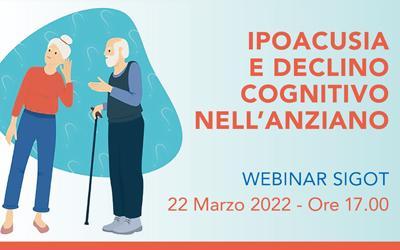IPOACUSIA E DECLINO COGNITIVO NELL’ANZIANO: TAKE HOME MESSAGES DAL WEBINAR SIGOT
24.03.2022
A cura della dottoressa Benedetta Soli
Il 22 marzo 2022 si è tenuto un webinar SIGOT relativo alla tematica della relazione tra ipoacusia e declino cognitivo. Il webinar ha coinvolto il presidente SIGOT, dott. Alberto Pilotto, in qualità di moderatore, i relatori dott. Andrea Fabbo, prof.ssa Elisabetta Genovese e dott. Francesco Saverio Ragusa. L’elevato valore scientifico delle relazioni si traduce in un’ampia letteratura di riferimento: lo scopo della presente monografia è di rendere accessibile ai soci i riferimenti agli articoli citati nelle presentazioni. Il 16% della popolazione europea, oltre 70 milioni di persone, presenta una perdita di udito superiore ai 25 DB; nei soggetti anziani, tuttavia, vi è tuttora una sottodiagnosi del problema (1,2). Il deficit uditivo presenta un’associazione significativa con altre condizioni quali deterioramento cognitivo, cadute, isolamento sociale, depressione (3-8). Gli stimoli acustici determinano un’attivazione della corteccia uditiva temporale e di altri circuiti neurali. Viceversa, la stessa attività cerebrale influenza la percezione uditiva. I deficit uditivi sono associati ad alterazioni cerebrali, in particolare ad una riduzione di volume della corteccia uditiva primaria nel lobo temporale (9,10,11, 21); si ritiene pertanto che vi sia una stretta correlazione tra la presenza di deficit uditivo e lo sviluppo di demenza (12,13, 15-17, 19, 20). La Lancet Commission ha definito l’ipoacusia come fattore di rischio per la demenza, sul quale è possibile intervenire (14). Il riconoscimento precoce e il trattamento dell’ipoacusia potrebbero dunque prevenire il declino cognitivo nella popolazione anziana (18, 22-25).
Il video completo del webinar è disponibile al link https://www.youtube.com/watch?v=LMltl3wsXks
- 1. Bernabei R, Bonuccelli U, Maggi S, Marengoni A, Martini A, Memo M, Pecorelli S, Peracino AP, Quaranta N, Stella R, Lin FR; participants in the Workshop on Hearing Loss and Cognitive Decline in Older Adults. Hearing loss and cognitive decline in older adults: questions and answers. Aging Clin Exp Res. 2014 Dec;26(6):567-73. doi: 10.1007/s40520-014-0266-3. Epub 2014 Oct 4. PMID: 25281432.
- 2. Agrawal, Yuri & Platz, Elizabeth & Niparko, John. (2008). Prevalence of Hearing Loss and Differences by Demographic Characteristics Among US Adults. Archives of internal medicine. 168. 1522-30. 10.1001/archinte.168.14.1522.
- 3. Lin F. R. (2011). Hearing loss and cognition among older adults in the United States. The journals of gerontology. Series A, Biological sciences and medical sciences, 66(10), 1131–1136. https://doi.org/10.1093/gerona/glr115
- 4. Lin, F. R., Yaffe, K., Xia, J., Xue, Q. L., Harris, T. B., Purchase-Helzner, E., Satterfield, S., Ayonayon, H. N., Ferrucci, L., Simonsick, E. M., & Health ABC Study Group (2013). Hearing loss and cognitive decline in older adults. JAMA internal medicine, 173(4), 293–299. https://doi.org/10.1001/jamainternmed.2013.1868
- 5. Lin FR, Ferrucci L. Hearing Loss and Falls Among Older Adults in the United States. Arch Intern Med. 2012;172(4):369–371. doi:10.1001/archinternmed.2011.728
- 6. Kramer SE, Kapteyn TS, Kuik DJ, Deeg DJ. The association of hearing impairment and chronic diseases with psychosocial health status in older age. J Aging Health. 2002 Feb;14(1):122-37. doi: 10.1177/089826430201400107. PMID: 11892756.
- 7. Shukla A, Harper M, Pedersen E, Goman A, Suen JJ, Price C, Applebaum J, Hoyer M, Lin FR, Reed NS. Hearing Loss, Loneliness, and Social Isolation: A Systematic Review. Otolaryngol Head Neck Surg. 2020 May;162(5):622-633. doi: 10.1177/0194599820910377. Epub 2020 Mar 10. PMID: 32151193; PMCID: PMC8292986.
- 8. Vernooij-Dassen, M., Verhey, F., & Lapid, M. (2020). The risks of social distancing for older adults: a call to balance. International psychogeriatrics, 32(10), 1235–1237. https://doi.org/10.1017/S1041610220001350
- 9. Lin FR, Ferrucci L, An Y, Goh JO, Doshi J, Metter EJ, Davatzikos C, Kraut MA, Resnick SM. Association of hearing impairment with brain volume changes in older adults. Neuroimage. 2014 Apr 15;90:84-92. doi: 10.1016/j.neuroimage.2013.12.059. Epub 2014 Jan 9. PMID: 24412398; PMCID: PMC3951583.
- 10. Johnson JCS, Marshall CR, Weil RS, Bamiou DE, Hardy CJD, Warren JD. Hearing and dementia: from ears to brain. Brain. 2021 Mar 3;144(2):391-401. doi: 10.1093/brain/awaa429. PMID: 33351095; PMCID: PMC7940169.
- 11. Chang M, Kim HJ, Mook-Jung I, Oh SH. Hearing loss as a risk factor for cognitive impairment and loss of synapses in the hippocampus. Behav Brain Res. 2019 Oct 17;372:112069. doi: 10.1016/j.bbr.2019.112069. Epub 2019 Jul 2. PMID: 31271817.
- 12. Vassilaki M, Aakre JA, Knopman DS, Kremers WK, Mielke MM, Geda YE, Machulda MM, Al Fakir R, Undavalli C, Roberts RO, Petersen RC. Informant-based hearing difficulties and the risk for mild cognitive impairment and dementia. Age Ageing. 2019 Nov 1;48(6):888-894. doi: 10.1093/ageing/afz099. PMID: 31437275; PMCID: PMC6814092.
- 13. Taljaard DS, Olaithe M, Brennan-Jones CG, Eikelboom RH, Bucks RS. The relationship between hearing impairment and cognitive function: a meta-analysis in adults. Clin Otolaryngol. 2016 Dec;41(6):718-729. doi: 10.1111/coa.12607. Epub 2016 Feb 28. PMID: 26670203.
- 14. Livingston G, Sommerlad A, Orgeta V, Costafreda SG, Huntley J, Ames D, Ballard C, Banerjee S, Burns A, Cohen-Mansfield J, Cooper C, Fox N, Gitlin LN, Howard R, Kales HC, Larson EB, Ritchie K, Rockwood K, Sampson EL, Samus Q, Schneider LS, Selbæk G, Teri L, Mukadam N. Dementia prevention, intervention, and care. Lancet. 2017 Dec 16;390(10113):2673-2734. doi: 10.1016/S0140-6736(17)31363-6. Epub 2017 Jul 20. PMID: 28735855.
- 15. Uhlmann RF, Larson EB, Rees TS, Koepsell TD, Duckert LG. Relationship of hearing impairment to dementia and cognitive dysfunction in older adults. JAMA. 1989 Apr 7;261(13):1916-9. PMID: 2926927.
- 16. Lin FR, Metter EJ, O'Brien RJ, Resnick SM, Zonderman AB, Ferrucci L. Hearing loss and incident dementia. Arch Neurol. 2011 Feb;68(2):214-20. doi: 10.1001/archneurol.2010.362. PMID: 21320988; PMCID: PMC3277836.
- 17. Nadhimi Y, Llano DA. Does hearing loss lead to dementia? A review of the literature. Hear Res. 2021 Mar 15;402:108038. doi: 10.1016/j.heares.2020.108038. Epub 2020 Jul 30. PMID: 32814645.
- 18. Leroi I, Simkin Z, Hooper E, Wolski L, Abrams H, Armitage CJ, Camacho E, Charalambous AP, Collin F, Constantinidou F, Dawes P, Elliott R, Falkingham S, Frison E, Hann M, Helmer C, Himmelsbach I, Hussain H, Marié S, Montecelo S, Thodi C, Yeung WK. Impact of an intervention to support hearing and vision in dementia: The SENSE-Cog Field Trial. Int J Geriatr Psychiatry. 2020 Apr;35(4):348-357. doi: 10.1002/gps.5231. Epub 2019 Dec 3. PMID: 31713262; PMCID: PMC7079053.
- 19. Jorgensen LE, Palmer CV, Pratt S, Erickson KI, Moncrieff D. The Effect of Decreased Audibility on MMSE Performance: A Measure Commonly Used for Diagnosing Dementia. J Am Acad Audiol. 2016 Apr;27(4):311-23. doi: 10.3766/jaaa.15006. PMID: 27115241.
- 20. Golub JS, Brickman AM, Ciarleglio AJ, Schupf N, Luchsinger JA. Association of Subclinical Hearing Loss With Cognitive Performance. JAMA Otolaryngol Head Neck Surg. 2020 Jan 1;146(1):57-67. doi: 10.1001/jamaoto.2019.3375. PMID: 31725853; PMCID: PMC6865840.
- 21. Croll PH, Vernooij MW, Reid RI, Goedegebure A, Power MC, Rigters SC, Sharrett AR, de Jong RJB, Mosley TH, de Groot M, Lin FR, Deal JA. Hearing loss and microstructural integrity of the brain in a dementia-free older population. Alzheimers Dement. 2020 Nov;16(11):1515-1523. doi: 10.1002/alz.12151. Epub 2020 Aug 2. Erratum in: Alzheimers Dement. 2021 Feb;17(2):293. PMID: 32743902.
- 22. Amieva H, Ouvrard C. Does Treating Hearing Loss in Older Adults Improve Cognitive Outcomes? A Review. J Clin Med. 2020 Mar 16;9(3):805. doi: 10.3390/jcm9030805. PMID: 32188074; PMCID: PMC7141203.
- 23. Castiglione A, Benatti A, Velardita C, Favaro D, Padoan E, Severi D, Pagliaro M, Bovo R, Vallesi A, Gabelli C, Martini A. Aging, Cognitive Decline and Hearing Loss: Effects of Auditory Rehabilitation and Training with Hearing Aids and Cochlear Implants on Cognitive Function and Depression among Older Adults. Audiol Neurootol. 2016;21 Suppl 1:21-28. doi: 10.1159/000448350. Epub 2016 Nov 3. PMID: 27806352.
- 24. Mosnier I, Bebear JP, Marx M, Fraysse B, Truy E, Lina-Granade G, Mondain M, Sterkers-Artières F, Bordure P, Robier A, Godey B, Meyer B, Frachet B, Poncet-Wallet C, Bouccara D, Sterkers O. Improvement of cognitive function after cochlear implantation in elderly patients. JAMA Otolaryngol Head Neck Surg. 2015 May 1;141(5):442-50. doi: 10.1001/jamaoto.2015.129. PMID: 25763680.
- 25. Mahmoudi E, Basu T, Langa K, McKee MM, Zazove P, Alexander N, Kamdar N. Can Hearing Aids Delay Time to Diagnosis of Dementia, Depression, or Falls in Older Adults? J Am Geriatr Soc. 2019 Nov;67(11):2362-2369. doi: 10.1111/jgs.16109. Epub 2019 Sep 4. PMID: 31486068.


